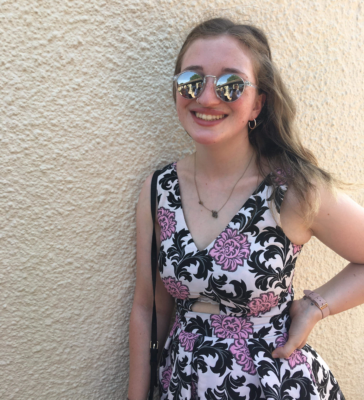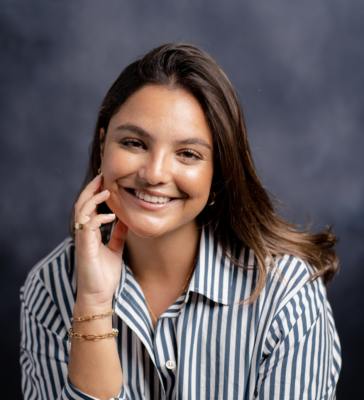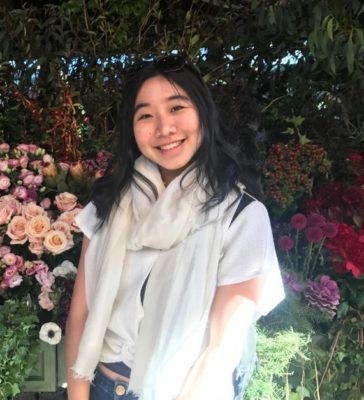
Becca McAuley
Current Employer/Organisation Name
Daily Mail
What have you been doing since leaving Exeter, and what are you doing now?
After I graduated from Exeter I did a MA in Newspaper Journalism at City, University of London. While I was there I did some work experiences at places like The Times, The Telegraph and PA where I learnt more about the different types of journalism which helped me to decide what sort of career I wanted. I applied successfully for the Trainee Sub-Editor Scheme at the Daily Mail and did a placement at Metro as part of my training before starting properly at the Mail.
Why did you choose this career? And what do you enjoy most about your work?
Before doing my MA I didn’t really know what sub-editing was or even that it existed as a job in its own right, but it’s exactly what I’ve always enjoyed most about journalism. I absolutely love being on the front line of getting the paper out each day – the sub-editors are some of the last journalists who read the stories that go into the paper before it is printed. I love the variety of stories I get to read and edit and it’s so cool seeing the paper coming together over a couple of hours. There’s also a great satisfaction in writing a good headline or caption, and it’s even better when the story you’ve subbed is picked up on the TV or radio when the papers are being reviewed. On a typical day I come into the office in the afternoon and read that day’s paper so I know the context if there are any follow-ups to come. In any one shift I could go from subbing a story on Prince Harry to one about a big row at the heart of government – the variation keeps it interesting. Once all the stories have been subbed and the paper has been checked and printed we go again for the second and third edition, when updates to stories and new stories are added.
Please tell us if you were a member of any societies, groups or sports clubs?
I was a member of the Politics Society the whole way through university and it was where I met some of my closest friends – I met one of my best friends at the first Politics Society social in first year. Politics also definitely had the best Christmas party – some of my favourite memories are from the Christmas do each year at the Rougemont Hotel. In my third year I was co-editor of The Witness, the university’s politics journal, which is where I started to realise my love of sub-editing – before I even realised that was what it was. I was also a member of Xpression, the radio station, which I made news reports for and where I contributed to the Friday evening news hour.
Were you part of the Exeter Student Ambassador Scheme at any point during your studies?
Yes.
What did you enjoy most about your programme and what was the biggest highlight?
My favourite thing about my BA at Exeter was the variety of modules I could choose from, which meant I could make my degree exactly what I wanted it to be. I’ve always been really interested in the Middle East so I took advantage of being able to study modules from outside my discipline and took modules from the Institute of Arab and Islamic Studies – Jonathan Githens-Mazerâ’s modules on Muslims in Britain and Nationalisms in the Middle East were definitely some of my favourites and the fact these were often smaller classes was hugely beneficial in allowing the class to discuss and debate the topics and learn from each other. The modules offered by the Strategy and Security Institute were brilliant too and it was amazing to be taught by experts from the field – people with experience at the top levels of decision-making including Dr David Blagden and Dr Sergio Catignani. I also really enjoyed studying Contemporary Public Debate in an Age of Anti-Politics, which definitely gave me food for thought at a time I was figuring out how to become a journalist and what sort of journalist I wanted to be.
What did you enjoy most about studying here?
The thing I enjoyed most about studying at Exeter was the variety of topics I could study. I’m sure if you asked someone else who did the same degree as me at the same time they would give you a totally different picture of what their degree entailed. Aside from the academic side of studying in Exeter, just living in the South West for three years was amazing. Being able to take a walk into the countryside or along by the quay, or take a train that would get you to the beach in under 30 minutes was such a privilege – and perfect for when deadlines were looming and you needed to get away for a bit, or to take some time out after handing in an essay. The campus itself is beautiful too – the Reed Hall gardens were a great place to grab five minutes of peace and quiet during a busy day of lectures, and the nature reserve round the back of the campus was great for clearing your head during a day of essay-writing in the library.
Why did you choose to study at Exeter?
It sounds like such a cliché, but I can still remember the day I visited Exeter on an open day and totally fell in love with it. It was really sunny and I remember feeling so happy there. The campus is absolutely beautiful and Exeter itself is the perfect city – big enough to have everything from a buzzing high street with amazing restaurants and cafes to the quay, countryside walks and plenty of pubs, but not too huge that you feel lost in it or have to rely on buses to get around. I wanted to choose somewhere to go to university where I would enjoy the lifestyle and not just the course, and Exeter offered me exactly that. I was never short of something to do or somewhere new to visit and it was somewhere I loved living and still enjoy going back to visit.
What skills and experiences have been most useful for your career?
My experience in student journalism at Exeter was invaluable – it gave me the skills I needed to be able to do a Masters while also convincing me that journalism was definitely the path I wanted to go down. The fact that my academic interests are also my journalistic interests meant everything I learnt in lectures taught me something that I could take with me in my career.
What advice would you give to a current student who wishes to pursue your career?
For anyone wanting to get into journalism generally, the best thing you can do is get experience and make this experience varied. Write for the student paper or the magazines, have a blog, get work experience at local and national publications. This will not only show your commitment but will help you to learn about different types of journalism and will give you an idea of what area you’d like to go into. For sub-editing the best advice I can give is read widely – this will help you to understand the different styles different newspapers or magazines have. Also don’t close yourself off to any types of news – as a sub-editor you can go from subbing a story about Love Island one minute to one about a big policy announcement the next so having at least some knowledge of lots of areas is vital.
What are your plans for the future?
I absolutely love sub-editing and in the future I’d like to expand my skill set to include commissioning. I would also be interested in one day working for a publication that focuses more in-depth on politics and policy decisions. I wouldn’t rule out a return to writing about politics in some form, though I definitely want more experience as a sub-editor first and I’m excited to see what the next few years hold.

